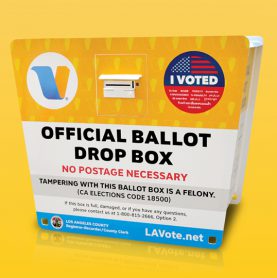Election Day 2020 is an important day for California voters and not just because of the presidential race. There are several propositions on the ballot this year that impact everything from school funding to voting regulations to app-based services.
Proposition 14 allows California to spend $5.5 billion in bonds on stem cell research and studies of other medical issues, such as Alzheimer’s Disease and dementia.
Proposition 15 increases funding for public schools, community colleges, and local government services by changing tax rules for commercial and industrial properties. Residential properties wouldn’t be affected.
Proposition 16 would repeal California’s Affirmative Action Amendment, which took effect in 1996. This initiative would remove the state’s ban on race-based or sex-based discrimination and leave the issue to federal government control.
Proposition 17 would enable California residents on parole for felony convictions to vote, which is a right they lose under current state law.
Proposition 18 would allow 17-year-old California residents to vote in the primary election if they are set to turn 18 by the upcoming general election.
Proposition 19 permits homeowners who are age 55, severely disabled, or lost their home to wildfire or disaster to transfer their primary residence’s property tax base value to a replacement residence of any value, anywhere in the state.
Proposition 20 restricts parole for non-violent offenders and allows prosecutors to increase the severity of certain offenses from a misdemeanor to a felony charge. Firearm theft, vehicle theft, and unlawful use of a credit card could be classified as felonies under this initiative. The law would also allow for DNA collection from more misdemeanor offenders.
Proposition 21 would limit how much landlords can raise the rent of an empty unit to 15 percent over three years.
Proposition 22 changes how people who work for app-based transportation and delivery services like Uber, Lyft, Grubhub, and Instacart are classified. If passed, they would be considered contract workers instead of employees. Labor laws specific to this kind of job would also be created.
Proposition 23 forms new regulations for kidney dialysis clinics and puts in place minimum staffing requirements. It also bans clinics from discriminating on the basis of who is paying for a patient’s care.
Proposition 24 amends consumer privacy laws by forcing companies to honor a person’s request that their online data not be shared. Under the law, companies would also have to get permission before collecting data on teens and children.
Proposition 25 would overturn a 2018 law that replaced cash bail for criminal offenders with a rating system based on public safety risk. A yes vote would keep the rating system in place and a no vote would reinstate the cash bail system.
Check out CCRC’s Get Out The Vote YouTube Series!
You can read more about the propositions by visiting the CA Secretary of State website.


